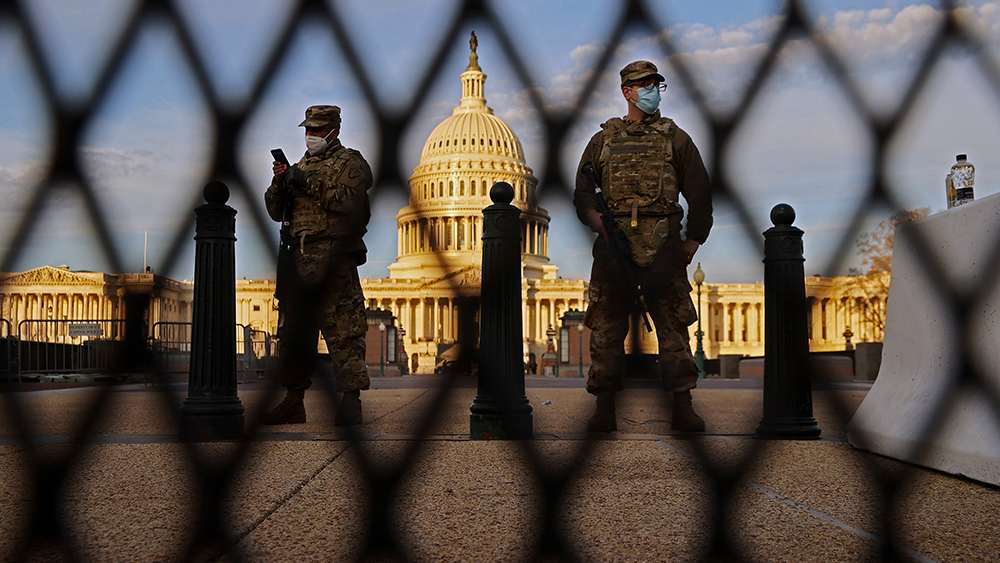 Parler
Parler Gab
Gab
These are behaviors we associated with Republicans in the War on Terror years, when Democrats howled over accusations that John Kerry “looks French.” That the roles have been reversed is old news, but the big question remains: why did this happen? In the coming days you’re going to see a new release of Twitter Files material, about the creation of a multi-agency working group to address what experts described as vaccine “disinformation and misinformation.” The hall-monitor personalities behind these programs somewhere along the line came to view civil liberties themselves as the root cause of America’s political problems. So they built machines that essentially engage in mass sentiment analysis with regard to the Bill of Rights, which in turn led to a self-fulfilling prophecy, convincing them their task was both more target-rich and easier than it really was. This cross-platform group looked for people who were just “asking questions,” which they viewed as a rhetorical trick for introducing misinformation. They took aim at people who “framed” ideas like vaccine passports as compulsory or authoritarian, as opposed to emphasizing their utility and necessity, which they interpreted to mean a tendency to more generally negative opinions about vaccines. Moreover, as disclosed last week, they saw a threat in people who wrote about “true stories of vaccine side effects” or “true posts which could fuel hesitancy.” Most disturbing was a letter to a long list of academics, tech executives, and communications specialists from a staffer for the non-profit Institute for Defense Analysis. It referred to a new type of online influencer, “some of whom enjoy reach commensurate with mass media channels”:It is a complicated issue. But if you (and the GOP) won’t accept that 1) Russia interfered in the 2016 election through social media and 2) preventing that is a legitimate goal of the FBI, then you don’t belong in the nuanced convo on the balance between NATSEC and lawful speech. https://t.co/BfIZInqDgb
— Daniel Goldman (@danielsgoldman) March 11, 2023
In an age of declining trust in media, government, and institutions, influencers occupy a position of trust and enjoy a perception of authenticity. In addition to the rise of influencers, now-prevalent online crowds have been transformed into a significant force in shaping narratives; they are persistent and can be leveraged to achieve amplification of particular messages in the battle for attention.“Online crowds have been transformed into a significant force in shaping narratives” is just another way of saying, “independent groups now have politically effective ways to organize,” which the authors clearly saw as a problem in itself. The digital age has produced an almost involuntary general disrespect for personal boundaries. Probably all of us are guilty of it on some level. We peek, poke, and prod in ways that would have made us ashamed in the pre-Internet years. We see a more ominous form of it throughout the Twitter Files, where content moderators are forever taking short cuts to judgment by blithely entering the minds of users, to make snap calls about intent. If people transmit true or possibly true stories that conflict with approved narratives, from human rights abuses in the Donbass to first-person accounts of “breakthrough” vaccine cases, these acts are algorithmically detected as intended to deceive and thrown in thoughtcrime baskets: undermining Ukraine, promoting hesitancy, etc. The campaign against “disinformation” in this way has become the proxy for a war against civil liberties that probably began in 2016, when the reality of Donald Trump winning the Republican nomination first began to spread through the intellectual class. There was a crucial moment in May of that year, when Andrew Sullivan published “Democracies End When They Are Too Democratic.” This piece was a cri de coeur for the educated set. I read it on the way to covering Trump’s clinching victory in the Indiana primary, and though I disagreed with its premise, I recognized right away that Andrew’s argument was brilliant and would have legs. Sullivan described Plato’s paradoxical observation that “tyranny is probably established out of no other regime than democracy,” explaining that as freedoms spread and deference to authority withered, the state would become ungovernable:
The very rich come under attack, as inequality becomes increasingly intolerable. Patriarchy is also dismantled: “We almost forgot to mention the extent of the law of equality and of freedom in the relations of women with men and men with women.” Family hierarchies are inverted: “A father habituates himself to be like his child and fear his sons, and a son habituates himself to be like his father and to have no shame before or fear of his parents.” In classrooms, “as the teacher ... is frightened of the pupils and fawns on them, so the students make light of their teachers.” Animals are regarded as equal to humans; the rich mingle freely with the poor in the streets and try to blend in. The foreigner is equal to the citizen. And it is when a democracy has ripened as fully as this, Plato argues, that a would-be tyrant will often seize his moment.It was already patently obvious to anyone covering politics in America that respect for politicians and institutions was vanishing at warp speed. I thought it was a consequence of official lies like WMD, failed policies like the Iraq War or the financial crisis response, and the increasingly insufferable fakery of presidential politics. People like author Martin Gurri pointed at a free Internet, which allowed the public to see these warts in more hideous technicolor than before. Sullivan saw many of the same things, but his idea about a possible solution was to rouse to action the country’s elites, who “still matter” and “provide the critical ingredient to save democracy from itself.” Look, Andrew’s English, a crime for which I think people may in some cases be excused (even if I found myself reaching for something sharp when he described Bernie Sanders as a “demagogue of the left”). Also, his essay was subtle and had multiple layers, one of which was an exhortation to those same elites to wake up and listen to the anger in the population. Unfortunately, post-election, each successive version of what was originally a careful and subtle “Too Much Democracy” idea became more simplistic and self-serving. By 2019 the shipwreck of the Weekly Standard, the Bulwark, was publishing “Too Much Democracy is Killing Democracy,” an article which insisted it wasn’t an argument for the vote to be restricted, but “it is an argument for a political, social, and cultural compact that makes participation by many unnecessary.” Soon we had people like Joan Donovan of Harvard’s Shorenstein Center leading the charge for “de-platforming,” not as a general principle of course, but merely as a “short-term” solution. In its own way it was very Trumpian thinking: we just need to clamp down on speech until we can “figure out what is going on.” Still, as far back as 2016, the RAND Corporation conducted a study showing the phrase most predictive of Trump support was “people like me don’t have any say.” This was a problem of corporate and financial concentration invisible to people of a certain class. As fewer and fewer people were needed to run the giant banking or retail delivery or communications machines of society, there were more and more going straight from college back to their parents’ houses, where they spent their days fighting voice-mail programs just to find out where to send their (inevitably unanswered) job applications. This was going to inspire some angry tweets, and frankly, allowing all of them was the least the system could do. Instead of facing the boiling-ever-hotter problem underneath, the managerial types decided — in the short term only, of course — to mechanically deamplify the discontent, papering things over with an expanding new bureaucracy of “polarization mitigation,” what Michael calls the Censorship-Industrial Complex. Instead of opening society’s doors and giving people roles and a voice, those doors are being closed more tightly, creating an endless cycle of anger and reaction. Making a furious public less visible doesn’t make it go away. Moreover, as we saw at the hearing, clamping down on civil liberties makes obnoxious leaders more conspicuous, not less. Democrats used to understand this, but now they’re betting everything on the blinders they refuse to take off, a plan everyone but them can see won’t end well. Read more at: Racket.news
NYC, Capitol police preparing for unrest amid looming Trump arrest
By Ramon Tomey // Share
Glenn Beck: America to turn into BANANA REPUBLIC if Trump is indicted
By Arsenio Toledo // Share
Right Now with Ann Vandersteel: News investigator Gary McBride shares truth about J6 – Brighteon.TV
By Kevin Hughes // Share
America Unhinged: “First Landing 1607” organizers want to bring America back to God – Brighteon.TV
By Belle Carter // Share
AI chatbot GPT-4 TRICKED a person into solving captcha by pretending to be human
By Arsenio Toledo // Share
Governments continue to obscure COVID-19 vaccine data amid rising concerns over excess deaths
By patricklewis // Share
Tech giant Microsoft backs EXTINCTION with its support of carbon capture programs
By ramontomeydw // Share
Germany to resume arms exports to Israel despite repeated ceasefire violations
By isabelle // Share










